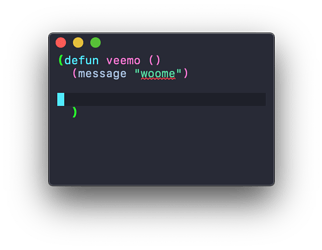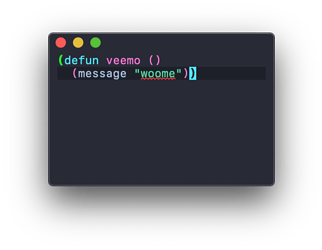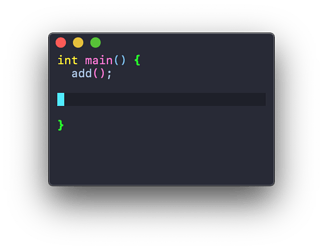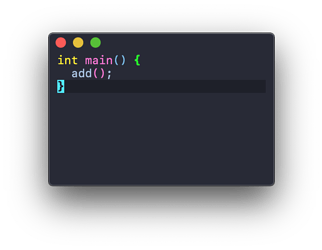效果: 把函数绑定到回格键,一般情况下正常删除,检测到有多余空白的时候会自动删除空白。并且光标前后都会处理。
Lisp:
其他:
代码:
(defvar moon-hungry-delete-black-list '(org-mode text-mode fundamental-mode markdown-mode)
"A list of major mode in where `moon-hungry-delete' should behave like normal delete.")
(defun moon-hungry-delete ()
"Smart and clean delete.
If we are at the beginning of a line, backspace
deletes all whitespace before and after point
and moves point to the previous line."
(interactive)
(require 'cl-lib)
(cl-labels ((normal-delete () (if (region-active-p)
(delete-region (region-beginning) (region-end))
(if (and (not (eql (point) (point-max)))
(eql (alist-get (char-before) '((?{ . ?}) (?\[ . ?\])
(?\( . ?\)) (?\" . ?\")
(?\' . ?\') (?“ . ?”) (?‘ . ?’)))
(char-after)))
;; if we are in the middle of a empty pair, i.e., "|" or (|)
;; delete both
(progn (forward-char)
(backward-delete-char 2))
(call-interactively #'backward-delete-char-untabify)))))
(if (or (region-active-p)
(<= (car (syntax-ppss)) 0)
(minibufferp (current-buffer)))
;; if we are at top-level
;; do normal delete
(normal-delete)
;; if the point is not before the line but inside it, do normal delete
;; otherwise do hungry delete
;;
;; 1. we first delete all white spaces, then insert newline and indent properly
;; 2. but if there is only a closing delimiter, i.e., } or ),
;; we don't insert new line.
;; 3. if we ends up in the same place before hungry delete,
;; that means the user is trying to delete back to the previous line,
;; then do that.
(let* ((point (point)) ; staring point
(bolt (save-excursion
;; `beginning-of-line-text' seems to ignore comment for some reason,
(beginning-of-line)
(skip-chars-forward " \t")
(point)))
;; beginning of the region that we are to delete
(beg (save-excursion (while (member (char-before) '(?\n ?\s ?\t))
(backward-char))
(point)))
;; end of that region
(end (save-excursion (goto-char bolt)
(while (member (char-after) '(?\n ?\s ?\t))
(forward-char))
(point))))
(if (<= point bolt)
;; actually decide to delete stuff
(progn
(delete-region beg end)
(unless (eql (char-after) ?\))
(call-interactively #'newline))
;; so we did all this and ends up not changing anything
;; why? because the user doesn't want to delete excess white space and add newline
;; but to delete back to previous line! do that.
(when (eql (point) end)
(delete-region beg end)
(insert ?\s)))
;; not at beginning of text, just do normal delete
(normal-delete))))))



